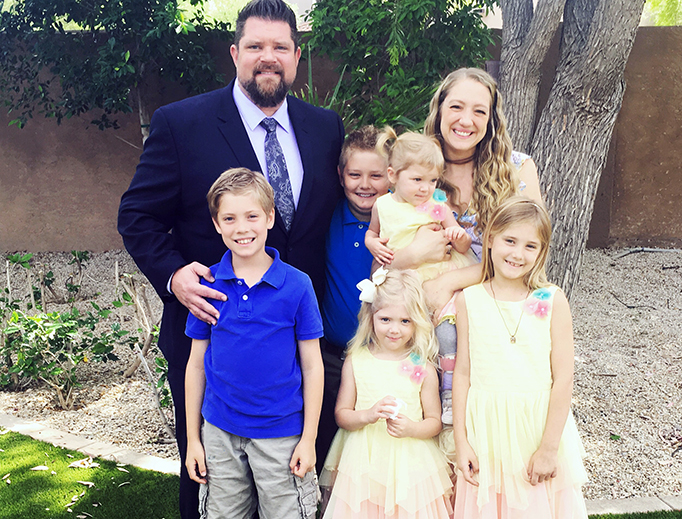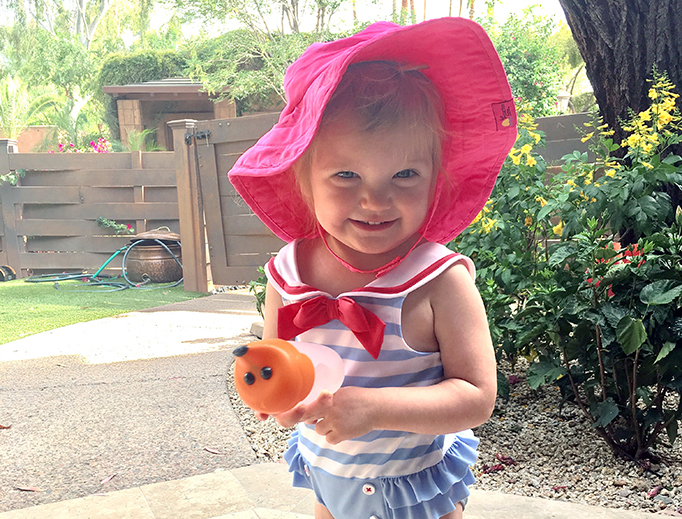An Update on the Drowned Toddler Who Made a Miraculous Recovery
“Control and security are illusions. That’s why it is so important to abandon ourselves to God’s Most Holy Will.”

Almost six months after Joy Loboda's heart stopped for nearly thirty minutes, she celebrates her second birthday with family and the medical professionals who saved her life.
When Matt pulled his daughter’s lifeless body out of his in-law’s pool and began performing CPR, he saw Joy’s pupils shrink to the size of a pinpoint (see “Drowned Toddler Is Making Miraculous Recovery”). He felt sure that he was losing her. Even so, he and his wife Kristin prayed. They continued to pray after seeing the sorrowful look in the eyes of EMTs, and they persevered in prayer when doctors said that Joy's heart had begun beating again—though the outcome for her looked bleak. The Lobodas’ story of their little girl fighting for her life spread like wildfire and tens of thousands joined them in prayer. Joy’s uncle, Fr. Ignatius Mazanowski, F.H.S, even said Mass at her bedside several times. Twenty-seven days later, on January 25th, 2017, Joy—in the arms of her beaming mother—left the Phoenix Children’s Hospital, and by her second birthday, May 22, she was almost completely healed.
Via phone, I talked with Joy’s parents, Kristin and Matt Loboda from Tampa, Florida, about how Joy’s fairing, how they’re processing the trauma, how it has changed them, and what they've learned about pool safety.
Flourishing
Thoroughly enjoying her birthday party, Joy zoomed around the emergency responders and doctors who came to celebrate with her. “I could see on their faces that it's a miracle that she is laughing and running around,” Kristin told the Register.
Speaking of Joy’s birthday party, Matt gets overcome by emotion, recalling the doctors telling him, “Joy has a slim chance that she is going to live; and if she does live, she’s going to be a ‘vegetable’.”
Matt also recalls the second day at the hospital when in the wee hours of the morning, he overheard a doctor say to a nurse about Joy, “She’s posturing; that’s a sign of brain damage.” As soon as the physician left the room, Matt leaped out of his chair, and he laid his hands on Joy’s head, beseeching the Lord, “In the name of Jesus, I command any and all brain cells that may have been damaged to restore themselves right now.”
“As I prayed,” recounts Matt, “I felt this heat and tingling in the front and back left part of my brain. I just took it as confirmation that God was answering my prayer, and He did! Joy is incredible. She is not only alive—she’s flourishing.”
Back in the Water
If Joy remembers what happened to her in the pool, she doesn’t show it. This past Memorial Day weekend, she swam with Matt—without a thread of fear—in the pool that almost claimed her life. Her peals of laughter overshadowed the drowning flashbacks that flickered through Matt's mind.
Kristin has not yet been able to bring herself to swim in the pool. Seeing Joy in her new pale blue sailor swimsuit that she had bought her for Christmas, she recalls, “I remember seeing it when I came home one night from the hospital, and I wondered if she would ever be able to wear it.”
Help for PTSD
For Kristin getting through the trauma of seeing her daughter floating in the pool and thinking that she had lost her nursing baby has been a longer healing process. “I’ll never forget the way my wife was wailing,” Matt reveals. “My heart still breaks for her that she experienced that.”
Seeing Joy lifeless was also difficult for Matt, but he was able to process things differently because he was the one who had been actively trying to save Joy by performing CPR. He also felt like he had to remain positive. “I had to die to myself and care for my wife and children. I had to provide stability for them in the midst of a lot of instability,” he explains. Unlike Kristin, Matt did not feel consumed with guilt.
Kristin says, “I am still healing from what happened. When I was in the hospital with her for the first day and a half, I felt like I had died with her.”
The Masses her brother, Fr. Ignatius Mazanowski, said at Joy’s bedside were healing balm for Kristin’s soul. Particularly the second Mass when he stopped in the midst of his homily and said to his sister, “A lot of time we think that the healing of the heart can take months or years, but it actually can be quick. You need to forgive yourself,” she recounts.
“When he said that, I broke into heart-wrenching cries. After that Mass, I was a new person; there was a supernatural strength that came over me,” she says.
Even though Kristin has been able to forgive herself, she feels like she is living in a hyper state, and she panics when Joy is out of her sight for a moment. Kristin is seeing a Catholic trauma counselor. “She’s been unbelievable in helping me wade through things.”
The Lobodas’ four older children, ages 10, 9, 7, 4, have also seen a counselor. “She gave them a glowing report and said that they were processing the trauma—they weren’t repressing it—and that real-time downloading of the experience minimized the trauma on them,” Matt explains.
God’s in Control
The Lobodas' faith has gained strength from their trial. For Kristin, even though she was already a religious person, almost losing Joy had made God’s presence and power more real in her life, and she sees the beauty in suffering more clearly. “When I was in the hospital, there was so much suffering for Joy and me. The beauty is if you allow God to be present in your suffering, then you are able to feel Him in that suffering.”
For Matt, Joy’s accident has put teeth in something Fr. Benedict Groeschel, C.F.R. used to say. “I had been a brother with the Franciscan Friars of the Renewal (C.F.R) for four years before God called me out,” he reveals. “Fr. Benedict used to tell us all of the time that control and security are illusions. That’s why it is so important to abandon ourselves to God’s Most Holy Will. This made sense intellectually, but when Joy drowned, what he said went from the head to the heart. I embraced the fact that God is ultimately sovereign —that control and security are fleeting. I thought I had both of those, but then my baby ends up in the pool.”
Pool Safety
Kristin was only away from Joy for a few minutes while busying herself with getting Joy’s car seat; she felt secure because Joy was with the children and other adults were present when the toddler slipped away unnoticed. What the Lobodas have learned is that there’s a false sense of security when there are several adults around. Another recent near drowning of a toddler, named Hadley DeSpain, punctuates this point. Erica DeSpain writes, “It’s easy to identify that I let my guard down when it came to watching Hadley closely because I assumed there were more people to watch her, but in this situation, more people actually served as a distraction. We all indirectly thought someone else was watching her.”
Kristin says that when there are future family get-togethers, there will be one adult whose sole responsibility will be to monitor the pool—though the Lobodas hadn’t had the enclosed pool on their radars at the time of Joy’s accident because it was too cold to swim.
One life-saving aspect for both of these little girls is that their fathers knew how to perform CPR and were cool under pressure. Chances are greater that a parent or relative will be performing CPR on a loved one rather than a stranger. For Matt, this was his second time performing CPR; his many years as a lifeguard played a role in Joy’s miracle.
Visit the American Red Cross to sign up for CPR classes in your area.














